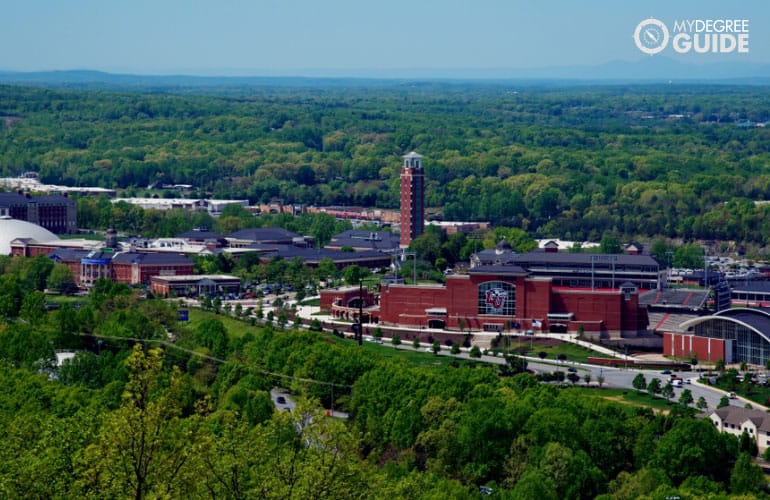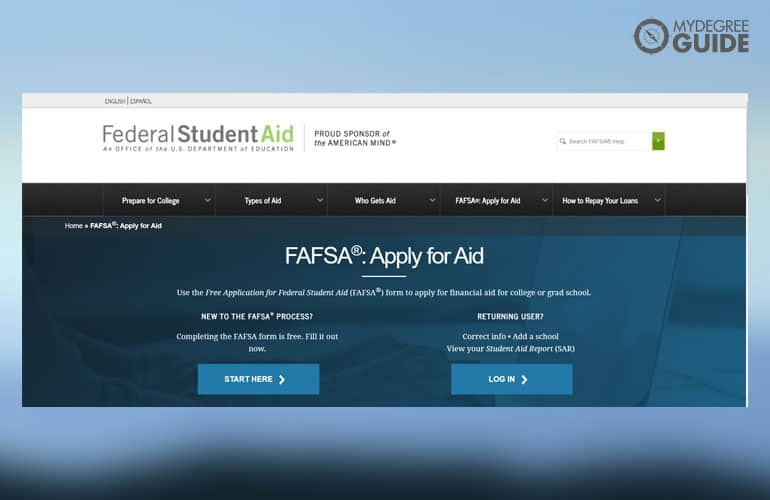Wondering how to get a bachelor’s degree fast online?

In this guide, we will give you some insider secrets, like getting credit for job training or military experience. You can even take a few multiple choice exams to get college credits fast (accepted by 2,000+ accredited universities).
Have you found yourself saying, I need a degree fast? This guide can help!
Fast Bachelor’s Degrees
Accelerated 8-week online classes can help you finish your degree at a faster pace.
Jump to the degree program that interests you most:
You can earn your bachelor’s degree online in these and nearly any other field of study. Before you decide, it’s helpful to think about what you might study, what you could do when you graduate, and what type of person does best in each area.
Accounting

A college degree in Accounting concentrates on financial bookkeeping for individuals, businesses, freelancers, governments, and other organizations. If you are getting an Accounting degree, you can specialize in public accounting, corporate accounting, tax counting, or another area.
This career path prepares you to advise, manage, and consult any type of business or a person who runs a business. If you are a person who likes stuff like fiscal responsibility or operational clarity, then an accounting career is the best choice for you.
In this degree path, you will learn auditing, business ethics, mathematics, business law, and microeconomics. After you are finished with your learning, you can get a job as a loan officer, budget analyst, personal or business financial advisor, or statistician, among others.
Anthropology

Anthropology is an intellectually exciting field that encompasses the study of history, linguistics, and cultural mores from diverse groups of people. This emphasis on fostering a deeper understanding of each group’s roots creates fertile soil for understanding diversity.
In this day and age, this is fundamental knowledge for anyone who seeks to create new solutions for creating more egalitarian societies.
Anthropology graduates can find numerous job opportunities in academia and government organizations, in addition to cultural outreach programs and international relations.
Business Administration

One of the best things about earning a college degree in Business Administration is the wide career opportunities you‘ll enjoy. Business Administration can offer you foundational skills, like communication and decision-making, accountancy and human resources.
Besides, career opportunities in Business Administration are growing because people keep opening businesses or organizations. If you are a person who is looking for a way to grow, a college degree in Business Administration is a perfect opportunity for you.
After getting your Business Administration degree in college, you can get a job in management or other specialized roled in small or large companies.
Communications

Communication is a daily part of life and one that is essential for human societies and relationships to form and develop. Despite the fact that communications are everywhere, true mastery of communications is equally rare and powerful.
By graduating from a Communications program, a student will become capable of disseminating (explicitly or subtly) large amounts of information to the society at large.
In this technical and globalized world, Communications can open many opportunities in social media management, design, marketing, public relations, and journalism.
Computer Science

A college degree in computer science develops the skills required to develop, design, and test computers and their systems. You can work as a financial technician, program in different computer languages, create video game designs, or be an electronic music engineer.
Your computer science courses will include application programming, information systems management, web development, and network fundamentals.
After finishing your college degree in Computer Science, you will have the doors open to a wide range of opportunities in the working world.
Criminal Justice

A full course of studies in Criminal Justice will be devoted to the study of both theoretical legal principles and the practical effects that these have on society – both when they are being respected, and when they are not.
The development of legal systems and the way they impact modern society is also placed under the spotlight, as are the applications of justice that are used to correct large-scale social ills.
A degree in Criminal Justice can lead to careers in law enforcement agencies, public policy agencies, or as a starting step toward Law School.
Education

A degree in Education prepares people to teach in a variety of ways. Depending on your interests and career goals, you can choose from different kinds of concentrations in education. Think about the age of your future students and a subject that you want to teach because this could impact your career opportunities.
When you graduate, you could get a job as a public school teacher, a librarian, or any other important position in the education field. Courses will include child psychology and development, education technology, theories of learning, and much more.
As noted before, you have a lot of different options after a college degree in education. Your area of specialization and the level that you choose to teach will also impact your earning potential.
Finance

As money makes the world go round, a degree in Finance provides an efficient way to access the organizations that move the hidden gears of our society. In addition to providing a thorough knowledge of the financial instruments that lie hidden from public view, a degree in Finance offers a solid foundation in micro- and macro-economics.
At the bachelor’s level, a degree in Finance offers the opportunity for pursuing further certifications and licensure as a financial advisor, real estate agent, or stock trader.
General Studies

A Bachelor of General Studies is often confused with the stereotypical “undecided” or “undeclared” major in many American Universities. The concept of General Studies and of multidisciplinary degrees, however, has a long and proud history on the Old Continent.
Thanks to its relative flexibility and the possibility of designing ad-hoc concentrations, completing a program in General Studies is seen as proof that a person can be taught, and therefore can be nurtured into a leader across a variety of fields.
Healthcare Management

A college degree in Healthcare Management opens you up for a strong career path after. You will learn not only about anatomy and psychology but also about business management, gain computer skills, and develop a strategic mindset.
After finishing your degree, you can get a job in a hospital, doctor’s office, or various laboratories (both public and private sectors). It is your choice whether you want to work “behind the scenes” or play a visible role, as this college degree will prepare you to work in finance, human resources, or healthcare administration.
This is a growing field that offers rewarding work as you help medical practices treat patients as professionally as possible.
Human Resources

For companies all across the world, human resources are actually the hardest to recruit, manage, and preserve. A Human Resources graduate is a specialist who combines the knowledge of management tactics, leadership, and revenue-oriented organizations with a keen eye for talent and for people’s motivations.
This combination of psychology, sociology, and business management is highly sought-after by all sorts of companies, at both the bachelor’s and master’s level.
Information Technology

If you are looking for a stable and profitable career, then you can choose a college degree in Information Technology. Nowadays, there are many places where you can work as an IT specialist and earn a salary of up to $200,000.
You can work in hospitals, large corporations, or retail as a software developer, network architect, computer programmer, or web developer.
Before choosing the right college to get a degree in Information Technology, you need to consider the size of the college, tuition fees, location, and online options. A college degree in information technology usually takes up to 4 years to finish. After that, you can enjoy a great career providing cutting edge solutions.
Legal Studies

This college degree is most suitable for those who are looking for careers in law and enforcement or criminal justice. Also, you can study social science, political science, sociology, anthropology, and economics.
Those who have completed a college degree in Legal Studies can work as paralegals, legal assistants, court reporters, and legal secretaries. Pre-law or legal studies prepare students for a range of careers both outside and inside the legal profession.
You could go on to work for a lawyer (or be a lawyer after further education) or work for the court system. If you enjoy law and the criminal justice system, this could be a very interesting profession for you.
Liberal Arts

The days in which the Liberal Arts were the core of a gentleman’s education may seem like they have long past. Nowadays, jobs and positions seem to be more connected to specific specializations.
The value of a well-rounded education, however, has never really gone away. Sales, public organizations, diplomats, and lawyers alike can all benefit from the solid civil framework provided by the general study of Liberal Arts.
This is an ideal course of study for creative-minded people who are eager to keep their doors open and find an affinity for several channels of knowledge simultaneously.
Marketing

Marketing is now more important than ever before. With social media and mobile web opportunities, businesses have more ways to reach their audiences. A college degree in marketing can place you in the right career path for this growing field.
As you study marketing, you can learn about sales and promotions and product placement strategies. You can also learn about human behavior and why they buy what they do. It is a very wide and interesting degree. It also involves business, commerce, and networking studies.
After finishing your college degree in Marketing, you can get a job as an advertising sales agent, insurance sales agent, sales engineer, real estate broker, or social media manager.
Psychology

This college degree focuses on learning how to understand human behavior, counseling skills, childhood development, the structure of the family, and much more.
It prepares you to work as a behavioral disorder counselor, marriage therapist, probation officer, social worker, or mental health counselor. If you think that you have the emotional acuity, strong mind, and compassion to help and work with other people, then this can be a very rewarding career path.
As a psychologist, you can help people get through their anxiety, personal loss, or post-traumatic stress. To become a licensed practitioner, you‘ll most likely need to further your education, but earning a bachelor‘s in Psychology lays the foundation for a successful career.
Public Health

Public health specialists are tasked with designing mid-and long term strategies that will impact the overall health levels of a large population. Generally, their focus is on a city, region, or country scale, rather than on an institution.
Public Health is one of the most delicate subsets of Public Administration and management. Its high degree of specialization should not be seen as a lack of applicability, however, at least where the job market is concerned.
Healthcare is a rapidly growing field, and governments around the world rely on experts to help regulate and improve this area of well-being.
Sociology

At its core, Sociology is the study of society and of the forces that help shape it. While it is a field that doesn’t directly translate into many private-sector job positions, the skills and analytical ability of a trained sociologist are very valuable in the workplace and the business world.
By studying the in-depth values and forces in a specific culture or region, sociologists are able to predict and theorize many emerging trends, which can then be used to plan public policy or marketing campaigns, depending on your interests.
How to Get a Bachelor’s Degree Fast – A Step-by-Step Guide

With online degrees, you have more options. How fast you get your bachelor’s degree is really up to you (and the college you choose).
To help you pick the right schools and programs, we’ve created a guide to give you the info you need to make the best choice for you.
- Choose a college with alternative credit options
- Take accelerated classes online (6 week or 8 week)
- Get college credit for your experience
- Get up to 1 year of credit with CLEP exams
Don’t see an answer to your question? Drop us a line in the comments. We want to help you graduate college faster!
How Can I Get My Bachelor’s Degree Fast?

The first step is to pick a college that has generous credit policies for non-traditional credit. Think credit for life experience, credit by exam, credit for military training, and similar policies that help you speed through your degree fast.
The best ways to can earn college credits more quickly include:
- Credit by exam (multiple choice, 90 minutes)
- Credit for prior learning (sometimes called life or work experience)
- Credit for military training
- Accelerated courses offered online
We’re not talking about just one specific college. If you have your heart set on a certain college, you can get a fast bachelor’s degree from them, too.
But some colleges are just better suited for getting your bachelor’s degree fast.
The college you choose will determine exactly how fast you can complete your degree. It’s up to you!
Choose a College with Alternative Credit Options

The following universities offer a number of ways to qualify for college credit without actually sitting in a classroom on campus.
Here are some examples of college policies that may allow you to get college credit outside of the classroom.
- College Level Examination Program (CLEP)
- Credit for Prior Learning (CPL)
- Prior Learning Assessment
- Credit for Military Training (in accordance with ACE standards)
Although each school has its own policies regarding these programs, they function in a similar way. Typically, the primary difference is how many college credits you are allowed to receive as a result of participation and approval. For example, some schools allow you only 15 credit hours with the CLEP program. Others may allow you 30 credit hours.
Credit for Prior Learning (CPL) programs vary widely by school, but most use the American Council on Education (ACE) guidelines to determine if your experience or training is worthy of college credit.
Here are two universities that offer some of these opportunities. They might look the same at first glance, but they have certain characteristics that set them apart.
If these schools aren’t a good fit for you, then carefully check your college’s policies to see if these opportunities are available.
Accelerated Online Classes – 6 Weeks or 8 Weeks?

Accelerated online classes are the other way to knock off classes quickly.
The time frame for the classes vary. Select the pace that best fits your schedule.
Here’s an Example

As an example of how quickly you can finish college with accelerated online classes, some universities allow you to take up to 3 classes per 8 weeks. Plus, they even have a January intensive 3-week term.
- Take 3 classes during the Fall-1 term (8 weeks)
- Take 3 classes during the Fall-2 term (8 weeks)
- Take 1 class during the January intensive term (3 weeks)
- Take 3 classes during the Spring-1 term (8 weeks)
- Take 3 classes during the Spring-2 term (8 weeks)
- Take 3 classes during the summer session
If you have the time (and energy) to maintain this course-load, you should be able to complete 16 classes in one year (48 credits).
Get College Credit for What You Already Know

Credit for prior learning (CPL) goes by a number of names. Sometimes, you’ll hear students ask if a university offers life experience credit or work experience credit.
The credit-granting policies vary widely by university, but it’s important to point out that accredited universities don’t just hand out college credits in exchange for a copy of your resume. To maintain academic quality and integrity, universities generally follow guidelines outlined by the American Council on Education (ACE).
With this in mind, some of the types of experience that may qualify include:
- ACE accredited corporate courses
- Excelsior Exams
- Advanced Placement Exams
- CLEP Exams
- Certified Professional Secretary Program
- Defense Language Proficiency Tests
- DANTES / DSST Exams
- International Baccalaureate
- Basic Law Enforcement and Corrections Training
- Military Service & Training (click here for detailed military credit information)
- Fire & Rescue Training Institute (FRTI) for the Associate in Science in Fire Service Administration
- Pilot’s License
- Real Estate License
- RN and LPN certification (for non-nursing degree students)
- PMP
- Various types of professional licenses
Even if your experience is not listed here, that doesn’t mean your prior learning isn’t applicable to your degree. Reach out to a college advisor and ask them about their prior learning assessment program to see if you qualify.
Credit by Examination – The Fastest Way to Get College Credits

Instead of taking the classes, what if you just took a few multiple choice exams and got credit for it?
It sounds like a scam, but it’s completely legit and accepted by over 2,000 accredited universities.
The two most common exam programs that award college credit for passing scores are the College Level Examination Program (CLEP) and Dantes Subject Standardized Test (DSST).
- You choose an exam to take and register online, paying a small registration fee.
- Study like mad using a CLEP or DSST study guide (you can find these on Amazon).
- Set up an appointment at a test center near you to take the exam.
- Take the exam.
- Get college credits… without going to class!
Other Credit by Exam options available are:
- Thomas Edison State Credit (TECEP)
- New York University Language Exams
- Excelsior College Exams (ECE)
Most colleges will accept Credit by Exam as a way for you to get your credit hours fast.
How Fast Can I Get My Bachelors Degree?

How fast is fast? The average is usually 2.5 years due to university restrictions.
Regardless of the college you decide to attend, you can use these strategies; some colleges simply have more generous policies than others:
- Credit for prior learning
- Credit by exam
- Transfer credits
- Military training
- Professional licenses
- Similar non-traditional credit options
So, if you’re wondering how to get a degree fast (in the fastest time possible), select schools with the most generous policies.
I Need a Degree Fast!
Going back to school and getting a bachelor’s degree is really a life-changing decision. But it can be done quicker than you might think. Now that you know how to get a bachelor’s degree fast, are you ready to start changing your life?
What is the Fastest Way to Get a Bachelor’s Degree?
The fastest way to get a bachelor’s degree is to:
- Enroll in accelerated online courses (6-week or 8-week online classes)
- Get credit for your experience (some colleges offer up to 1 year of college credit!)
- Test out of college courses
Using these three methods will allow you to earn college credits much more quickly. Plus, if you have any previous college credits, you should definitely transfer those credits into your new degree program (even if they simply fill up your degree program electives).
Don’t Forget Accreditation!

Before you get too excited and enroll in an online university, make sure it’s the real deal by checking its accreditation. Colleges that submit to and earn regional accreditation are respected by other educational institutions and employers. If a school isn’t accredited, there’s a high chance that its programs don’t meet the highest standards.
It’s best to enroll in a university that’s accredited by one of these independent boards:
- Higher Learning Commission (HLC)
- Middle States Commission on Higher Education (MSCHE)
- New England Commission of Higher Education (NECHE)
- Northwest Commission on Colleges and Universities (NWCCU)
- Southern Association of Colleges and Schools Commission on Colleges (SACSCOC)
- WASC Senior College and University Commission (WSCUC)
When you attend an accredited school, you can be sure of receiving a high-quality education. Check the U.S. Department of Education’s database to see how each school ranks.
Financial Aid Opportunities

And, of course, don’t skip looking for all the financial aid opportunities available to you. You could qualify for:
- Grants
- Deferred Loans
- Scholarships from the University or Private Organizations
- Work Programs
- Employee Tuition Reimbursement
Start by filling out the Free Application for Federal Student Aid (FAFSA).
Runners, to Your Mark!

Don’t waste any more time. There are plenty of online programs and ways to earn your college degree quickly. It’ll take some research to find the best school for you, and it’ll take some hard work finishing your degree. But you can do it! Thousands of students every semester.
Still have questions? Drop us a comment below!








